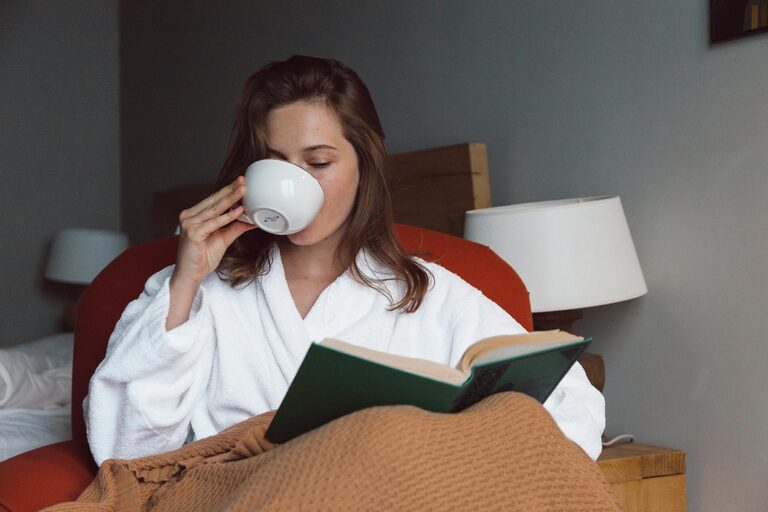A good night’s sleep starts well before you hit the pillow. Creating a relaxing bedtime routine not only eases your mind but also signals your body that it’s time to wind down. With consistent habits, you can improve your sleep quality and wake up feeling refreshed.
In this post, we’ll explore how to develop a bedtime routine that promotes relaxation and supports healthy sleep habits.
Why a Bedtime Routine Matters
Our modern lives often involve screens, stress, and irregular schedules that can disrupt natural sleep patterns. Establishing a calming routine before bed helps:
– Reduce stress and anxiety
– Prepare your body for sleep
– Improve sleep quality and duration
– Make it easier to fall asleep naturally
The key is to keep your routine simple, enjoyable, and consistent every night.
Steps to Create a Relaxing Bedtime Routine
1. Set a Consistent Time to Sleep and Wake Up
Try to go to bed and wake up at the same time every day, even on weekends. This regular schedule helps regulate your body’s internal clock, making it easier to fall asleep and wake naturally.
2. Wind Down at Least 30 Minutes Before Bed
Give yourself half an hour to relax without any stimulating activities. This signals your brain to slow down and prepare for rest.
3. Limit Screen Time
Electronic devices emit blue light, which can interfere with the production of melatonin—a hormone that controls sleep. Avoid smartphones, tablets, TVs, or computers at least 30 minutes before bedtime.
If you must use screens, consider enabling “night mode” or blue light filters.
4. Create a Calm Environment
Make your bedroom a peaceful sanctuary. Consider:
– Dimming the lights or using soft lamps
– Adjusting room temperature to a comfortable level (around 65°F or 18°C)
– Using blackout curtains to block external light
– Minimizing noise or trying white noise machines
A cozy environment helps your body relax and signals that it’s time to sleep.
5. Practice Relaxing Activities
Choose calming activities that help your mind and body unwind. Some ideas include:
– Reading a book: Preferably print books or e-readers without backlight
– Listening to soothing music or nature sounds
– Taking a warm bath or shower: Warm water helps lower core body temperature afterward, which can induce sleepiness
– Gentle stretching or yoga: Light movement helps relieve muscle tension
– Meditation or deep breathing exercises: These reduce stress and promote relaxation
Try a few and see what works best for you.
6. Avoid Heavy Meals, Caffeine, and Alcohol Before Bed
Eating large or spicy meals late at night can cause discomfort or indigestion. Caffeine is a stimulant that can keep you awake, so avoid coffee, tea, and chocolate at least 4–6 hours before bedtime.
Although alcohol might make you feel sleepy, it can disrupt your sleep cycle and reduce restfulness.
7. Limit Naps During the Day
Long or late-afternoon naps can interfere with nighttime sleep. If you need to nap, keep it short (about 20 minutes) and earlier in the day.
8. Prepare for the Next Day
Spend a few minutes organizing your plans or laying out clothes for tomorrow. This simple practice can reduce morning stress and clear your mind before sleep.
Sample Relaxing Bedtime Routine
Here’s an example routine you can adapt to your preferences:
- 8:30 pm – Turn off electronic devices or switch to night mode
- 8:45 pm – Take a warm shower or bath
- 9:00 pm – Read a book or listen to calming music with dim lights
- 9:20 pm – Practice 5 minutes of deep breathing or meditation
- 9:30 pm – Write a brief journal entry to clear your mind
- 9:40 pm – Lights out and get comfortable for sleep
Tips for Sticking to Your Routine
– Start small: Begin with one or two calming activities and build from there
– Be consistent: Aim to follow your routine at the same time nightly
– Listen to your body: Adjust activities or timing based on how you feel
– Create reminders: Use alarms or notes to prompt your routine
– Make it enjoyable: Choose soothing activities you look forward to
Final Thoughts
Building a relaxing bedtime routine takes time and patience, but the benefits for your sleep health are well worth it. By prioritizing nightly habits that promote calm and rest, you set yourself up for better energy, mood, and overall well-being.
Sweet dreams!

